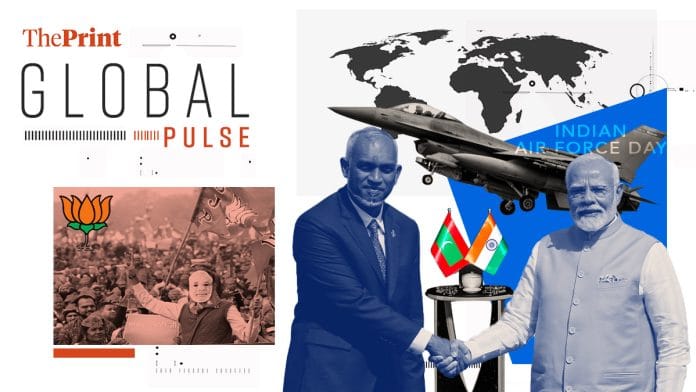New Delhi: While Maldivian President Mohamed Muizzu’s first bilateral visit was hailed as a diplomatic win in India, a report in the Maldivian media, quoting a top opposition leader, branded it a show of “naivety and inexperience in diplomacy”.
The Maldivian news outlet, Sun, in ‘MDP president slams Maldives administration’s ‘naivety and inexperience’ in diplomacy’, reported comments made by Abdullah Shahid, the leader of the pro-India Maldivian Democratic Party. The Muizzu government, he said, has come to the realisation that “international relations cannot be conducted based on lies and deceit”. Shahid made the comments on X.
The stand is unsurprising given that Muizzu was elected on an ‘India Out’ campaign and shocked diplomatic circles with his demand that India withdraw its troops from the Maldives. His campaign was also heavy on anti-India rhetoric, accusing it of infringing on the islands’ sovereignty. The tensions between the two countries had escalated after three Maldivian ministers made disparaging remarks about India. Who can forget that the Indian government had, in response, pitched the Union territory of Lakshadweep as a tourist destination for Indians as an alternative to the Maldives.
But despite the initial hostility, the report noted, the three ministers were suspended and the two sides continued to express “keenness” to work together. To that effect, as part of Muizzu’s visit, India’s RuPay card was launched in the Maldives, a new runway was inaugurated at Hanimaadhoo Airport, several cooperation agreements were renewed, and plans for a new Indian consulate in Maldives were discussed.
Shahid went on to express hopes that “the current trajectory in Maldives-India relations continue”. The Sun noted that Shahid said India was Maldives’ “closest neighbour, friend, and partner”. The subtext, of course, is a looming financial crisis in the Maldives, even as Chinese debt collectors wait in the wings.
At home, there seems to be a wariness around Muizzu’s sudden pivot away from China and towards India. And just like over the Maldives, India and China are also competing over their military development.
But India really shouldn’t be seeing China as a rival—at least, according to Chinese state media Global Times.
In the report, ‘Indian Air Force should not perceive China as a rival: experts’, Global Times reporters Liu Xuanzun cites Chinese experts in the discussion over Air Chief Marshal A.P. Singh’s comments that India “lags behind” China when it comes to military technology, defence production and infrastructure.
The experts, the report said, refute what they perceive to be India’s hyperbole over Chinese military advancement. Clearly, China should not be used as an example for exemplary military development because it doesn’t want to be one.
“The Indian Air Force is sensationalising China’s reasonable and legitimate national defence development, using China as an excuse to gather more funding and put more pressure on India’s domestic defence industry,” the report said, quoting an anonymous Chinese military expert.
India’s defence projects have been facing challenges because of their long development cycles, high costs, and slow production rates—this, the piece said, is a purely Indian issue and should not be projected as China’s fault. “The current situation along the China-India border is generally stable, and the hype by the Indian Air Force is not conducive to improving bilateral ties,” according to one of the experts the Global Times has spoken to.
Furthermore, according to observers, “India has the right to develop its national defence, including its independent defence industry, but such development should not be based on perceiving China as a rival, as China does not have the intention to engage in an arms race with India.”
The New York Times shared an interview of Athens Democracy Forum panelists, Yamini Aiyar, a visiting senior fellow at Brown University, and Maya Tudor, a professor and a fellow at Oxford University, on Prime Minister Narendra Modi’s future, his allure, and his impact on India’s democratic processes. The conversation was in context of the Bharatiya Janata Party’s failure to win a simple majority in the Lok Sabha elections, the report said.
In the story, titled ‘Does India Offer a Glimmer of Hope for Democracy?’, Tudor said India epitomises how democracy is eroding around the world “quietly and slowly”, and not with a bang nor “through tanks rolling in the streets and military generals grabbing governments, or through leaders who come to power and cancel elections”.
Aiyar highlighted that by bringing “criminal cases …against opposition politicians, curbing dissent of independent voices, as well as complete and total control of mainstream media” the playing field at the start of the elections was not level.
“All of these were elements of why several of us have argued that democracy was backsliding,” she added.
However, this turn is reversible, Tudor said.
“But the real ray of hope in India is that it has not come to the point where there is a supermajority in Parliament, which, of course, the Modi government was actively pursuing and which would have allowed it to change the Constitution. I think that many people are breathing a real sigh of relief and feel that Indian democracy is in safer territory,” she said.
(Edited by Sanya Mathur)
Also Read: Global media on how India is cooling—the homes of its own people & towards its neighbour Pakistan






